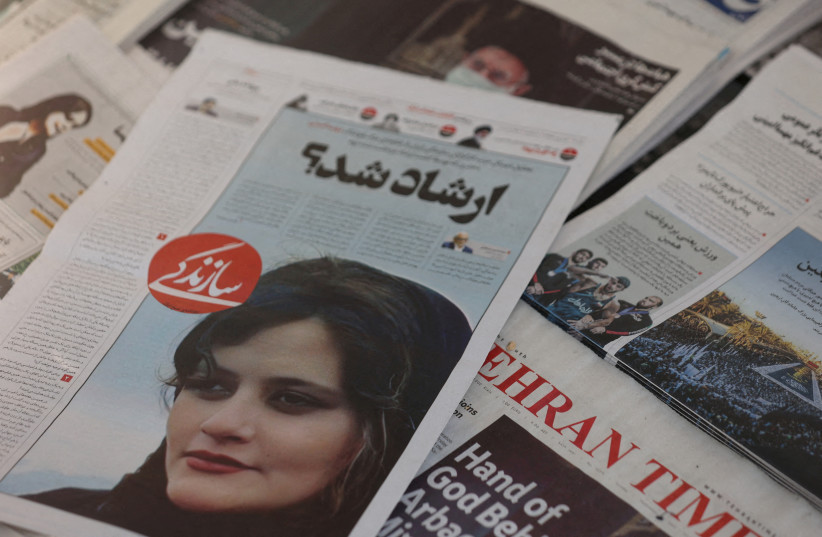Mehran Tamadon, the Iranian director of the unusual documentary, My Worst Enemy, showing at the Haifa International Film Festival (which closes on Friday) sat down in the sunny garden behind the Haifa Cinematheque to talk about Iranian torturers.
The funny, self-deprecating Tamadon spoke animatedly in French-accented English about why he made a film about one of the darkest aspects of Iranian life. The Paris-based director, an architect by profession, was born in Iran and left as a child; then later returned to live there for several years. He turned to documentary filmmaking to explore the contradictions at the heart of his homeland. In several of his previous films, he spent time with and filmed those who are at the ideological center of the regime.
In Iranian (2014), he spent two days in a cramped apartment with four mullahs, discussing their beliefs. Previously, he worked for three years on the documentary, Bassidji (2009), in which he became close to a group, the Bassidjis, the most fanatical supporters of the Islamic Republic, and tried to understand them. At one point, Iranian officials became so angry with him over his films that they confiscated his passport and detained him, an experience that left its mark on him psychologically as he was unable to stop thinking about the men who interrogated him.
What inspired the film?
One of Tamadon’s main goals in the stunning and original My Worst Enemy, was to get into the heads of those who carry out the regime’s cruel tortures on those who have been arrested. His film is more relevant than ever in light of the “Woman, Life, Freedom” movement in Iran that began in the wake of the killing of Mahsa Amini and has led to spontaneous and widespread protests by women who refuse to obey the modesty laws. To explore the minds of the interrogators, he asked three Iranian refugees who had experienced the regime’s repression to reconstruct their experiences and to put him through an ideological interrogation.

Two of them refused, but actress/director Zar Amir Ebrahimi eventually, reluctantly, agreed. Ebrahimi, who won the Best Actress Award at Cannes for the movie, Holy Spider, and who stars in and co-directed the film, Tatami, with Guy Nattiv, makes for a formidable opponent, and the bulk of the film is devoted to a mock but very realistic investigation she carries out of Tamadon, staged in an empty Paris apartment.
While we tend to think of torture as a matter of physical force used to get answers, Tamadon said that psychological torture is a no less potent weapon.
“Zar was interrogated every day for more than a year,” he said. Unlike many, she was able to see her tormenters and look them in the eye. “She internalized the way that the torturers can break you by exposing your most intimate secrets and fears.”
Ebrahimi, as the interrogator, elicits details of an affair she suspects Tamadon had, eventually forcing him to strip to his underwear and walk the streets of Paris with her.
Only at the end does she speak about her own interrogation, describing an especially harrowing moment from what was supposedly a routine medical examination. It is horrifying to hear about this and it clearly brings the trauma back to her.
“When you saw that, you were probably thinking, ‘What a bullsh*t filmmaker he is, to make her suffer like that.’ It did feel to me that I was being cruel.” But the director, who said that he thought that around 80% of the Iranian population does not support the regime, said he felt it was important to understand what Ebrahimi went through.
Tamadon’s aim is not just to detail the tactics the interrogators use but to understand these torturers, to get into their heads, and in order to change their thinking – eventually.
“Most of the torture at the beginning of the Islamic Revolution was done by those people who were tortured in the jails of the Shah’s regime,” he said. “They were tortured, they wanted to make others suffer the way they had.”
It is important to understand them in order to break the cycle, he said. “You can’t control, you can’t change, what you can’t see,” he said. “You can only control what is out in the open.”
Part of understanding them was realizing that for many interrogators, it’s simply a job. When he was detained after his passport was confiscated, one of his interrogators told him, “I punch a card when I come in the morning and then I leave every night. You can stay here for three months [if you don’t talk], I don’t care. I earn the same money.”
This stayed with Tamadon, and made him think: “But this guy, he has a conscience, too. How can we touch his conscience and make him see that he is a monster?” He hopes that My Worst Enemy is a first step to doing just that.
